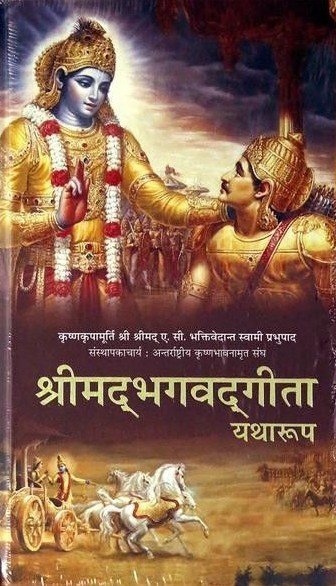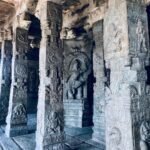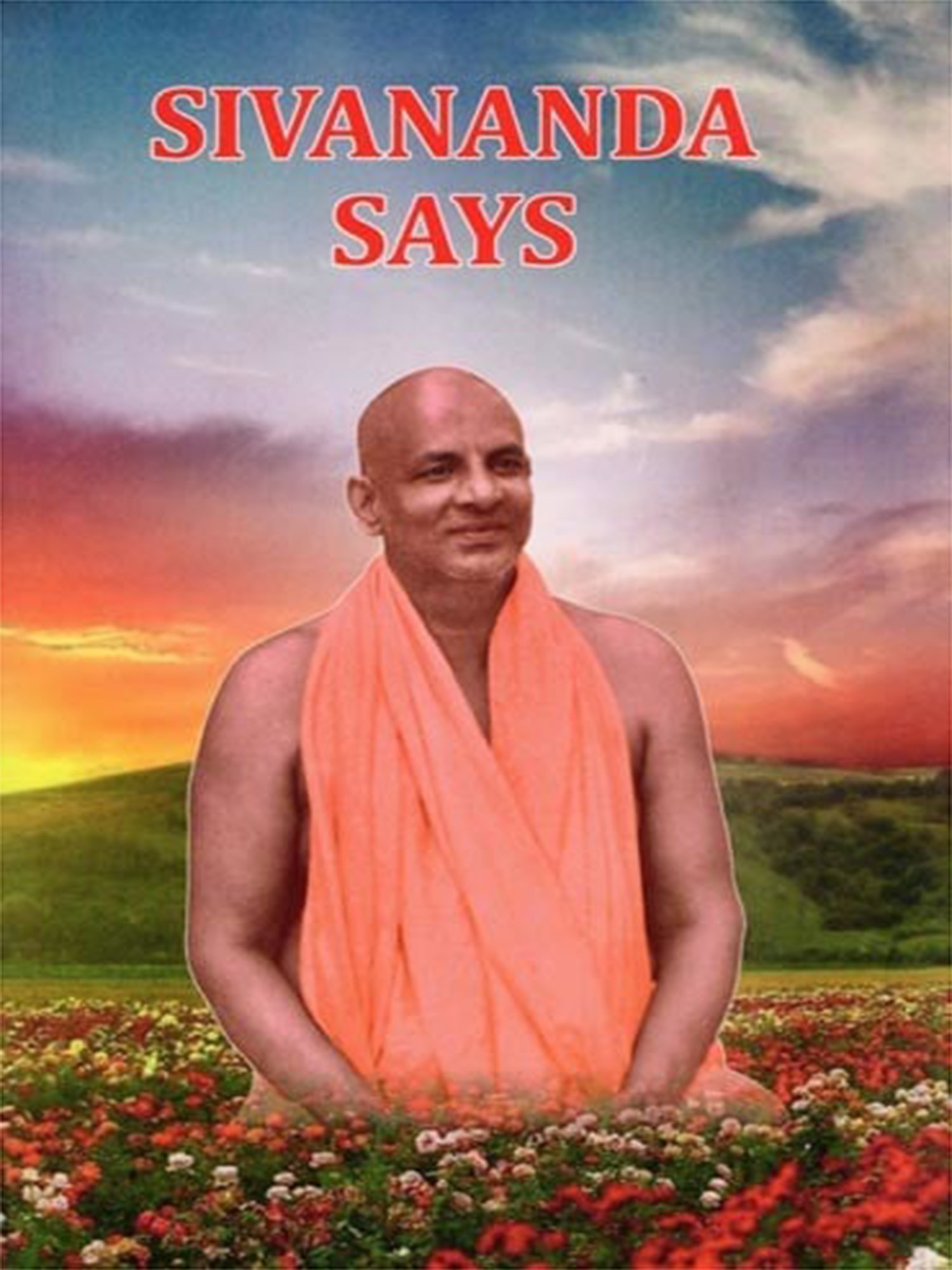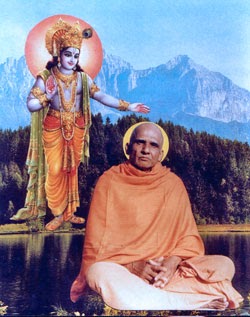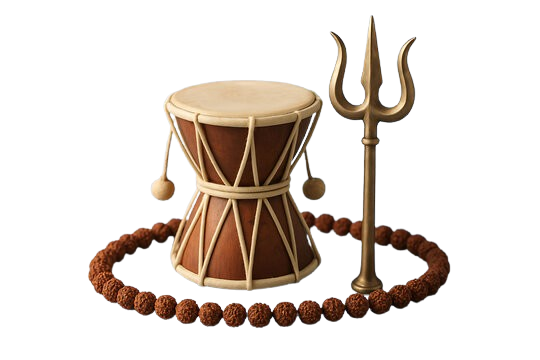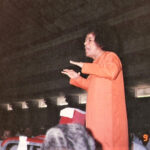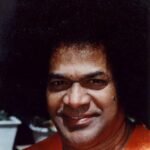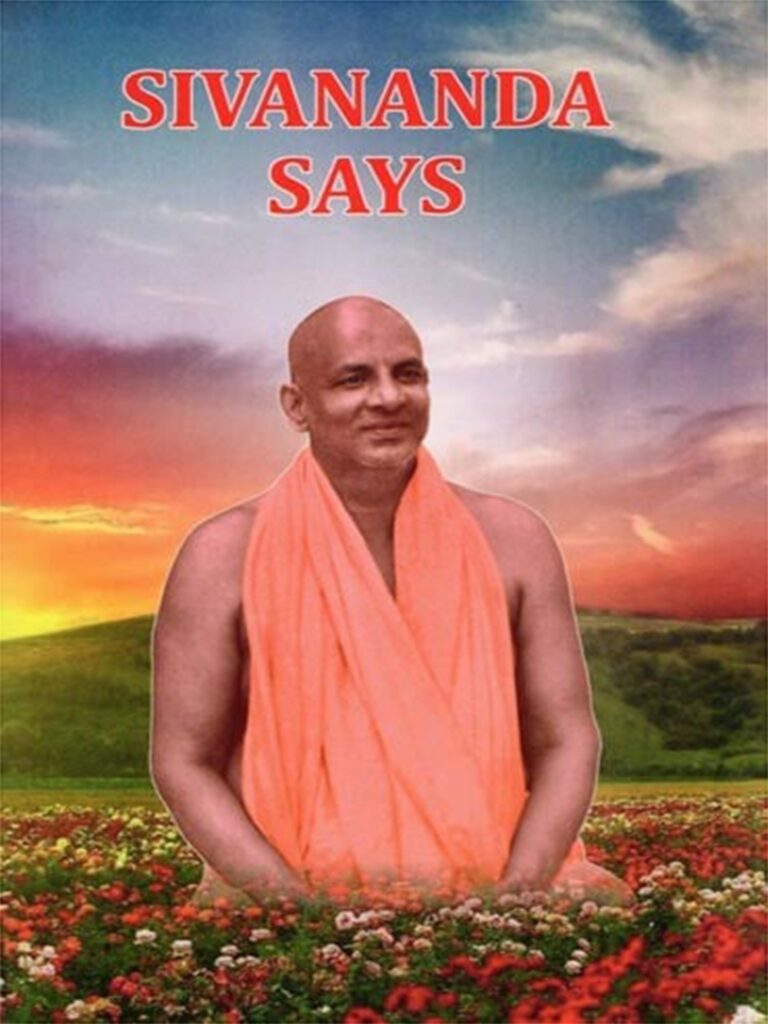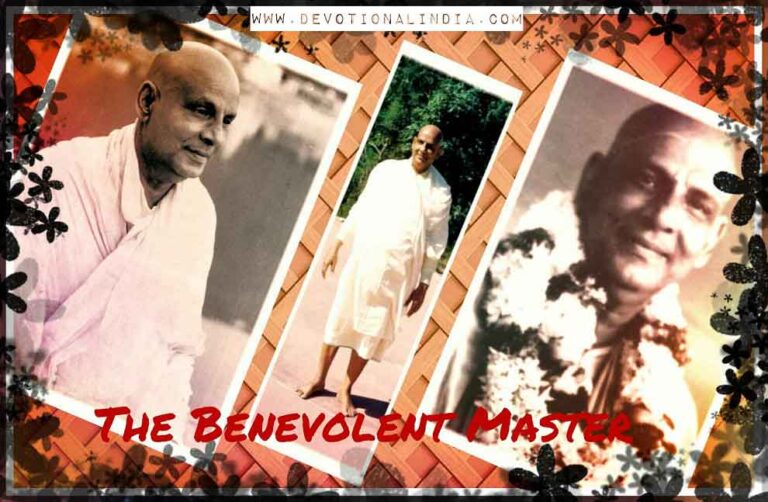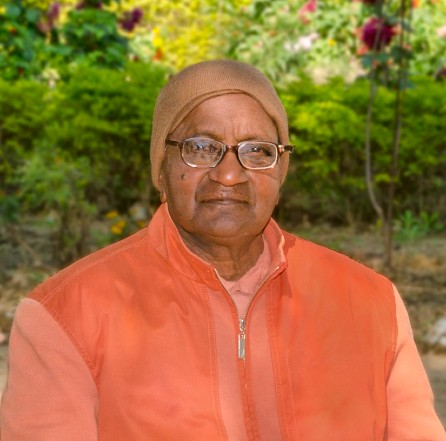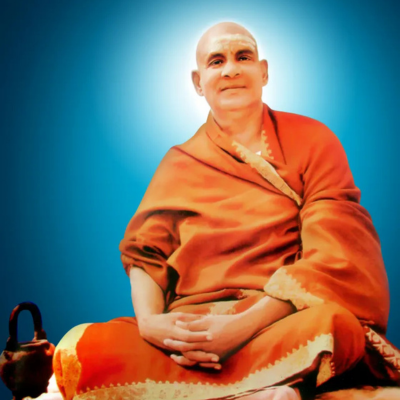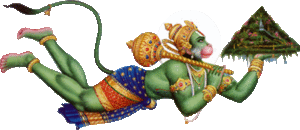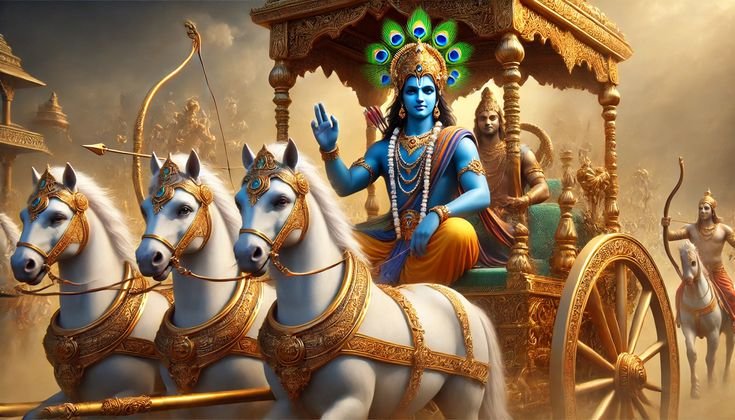Chapter Five
Chapter 5
Karma Sanyasa Yoga
The fifth chapter of the Bhagavad Gita is “Karma Sanyasa Yoga”. In this chapter, Krishna compares the paths of renunciation in actions (Karma Sanyas) and actions with detachment (Karma Yoga) and explains that both are means to reach the same goal and we can choose either. A wise person should perform his/her worldly duties without attachment to the fruits of his/her actions and dedicate them to God. This way they remain unaffected by sin and eventually attain liberation.
Bhagavad Gita 5.1
अर्जुन उवाच संन्यासं कर्मणां कृष्ण पुनर्योगं च शंससि। यच्छ्रेय एतयोरेकं तन्मे ब्रूहि सुनिश्िचतम्।।5.1।।
arjuna uvācha sannyāsaṁ karmaṇāṁ kṛiṣhṇa punar yogaṁ cha śhansasi yach chhreya etayor ekaṁ tan me brūhi su-niśhchitam
arjunaḥ uvācha—Arjun said; sanyāsam—renunciation; karmaṇām—of actions; kṛiṣhṇa—Shree Krishna; punaḥ—again; yogam—about karm yog; cha—also; śhansasi—you praise; yat—which; śhreyaḥ—more beneficial; etayoḥ—of the two; ekam—one; tat—that; me—unto me; brūhi—please tell; su-niśhchitam—conclusively
Translation
Arjuna said, “O Krishna, you praise renunciation of actions and also yoga. Please tell me conclusively which is better of the two.”
Commentary
5.1 संन्यासम् renunciation? कर्मणाम् of actions? कृष्ण O Krishna? पुनः again? योगम् Yoga? च and? शंससि (Thou) praisest? यत् which? श्रेयः better? एतयोः of these two? एकम् one? तत् that? मे to me? ब्रूहि tell? सुनिश्चितम् conclusively.Commentary Thou teachest renunciation of actions and also their performance. This has confused me. Tell decisively now which is better. It is not possible for a man to resort to both of them at the same time. Yoga here means Karma Yoga. (Cf.III.2)
Bhagavad Gita 5.2
श्री भगवानुवाच संन्यासः कर्मयोगश्च निःश्रेयसकरावुभौ। तयोस्तु कर्मसंन्यासात्कर्मयोगो विशिष्यते।।5.2।।
śhrī bhagavān uvācha sannyāsaḥ karma-yogaśh cha niḥśhreyasa-karāvubhau tayos tu karma-sannyāsāt karma-yogo viśhiṣhyate
śhrī-bhagavān uvācha—the Supreme Lord said; sanyāsaḥ—renunciation; karma-yogaḥ—working in devotion; cha—and; niḥśhreyasa-karau—lead to the supreme goal; ubhau—both; tayoḥ—of the two; tu—but; karma-sanyāsāt—renunciation of actions; karma-yogaḥ—working in devotion; viśhiṣhyate—is superior
Translation
The Blessed Lord said, “Renunciation and the Yoga of action both lead to the highest bliss; but of the two, the Yoga of action is superior to the renunciation of action.”
Commentary
5.2 संन्यासः renunciation? कर्मयोगः Yoga of action? च and? निःश्रेयसकरौ leading to the highest bliss? उभौ both? तयोः of these two? तु but? कर्मसंन्यासात् than renunciation of action? कर्मयोगः Yoga of action? विशिष्यते is superior.Commentary Sannyasa (renunciation of action) and Karma Yoga (performance of action) both lead to Moksha or liberation or the highest bliss. Though both lead to Moksha? yet of the two means of attaining to Moksha? Karma Yoga is better than mere Karma Sannyasa (renunciation of action) without the knowledge of the Self.But renunciation of actions with the knowledge of the Self is decidedly superior to Karma Yoga.Moreover? Karma Yoga is easy and is therefore suitable to all. (Cf.III.3V.5VI.46)
BG 5.3
ज्ञेयः स नित्यसंन्यासी यो न द्वेष्टि न काङ्क्षति। निर्द्वन्द्वो हि महाबाहो सुखं बन्धात्प्रमुच्यते।।5.3।।
jñeyaḥ sa nitya-sannyāsī yo na dveṣhṭi na kāṅkṣhati nirdvandvo hi mahā-bāho sukhaṁ bandhāt pramuchyate
jñeyaḥ—should be considered; saḥ—that person; nitya—always; sanyāsī—practising renunciation; yaḥ—who; na—never; dveṣhṭi—hate; na—nor; kāṅkṣhati—desire; nirdvandvaḥ—free from all dualities; hi—certainly; mahā-bāho—mighty-armed one; sukham—easily; bandhāt—from bondage; pramuchyate—is liberated
Translation
He should be known as a perpetual Sannyasi who neither hates nor desires; for, free from the pairs of opposites, O mighty-armed Arjuna, he is easily freed from bondage.
Commentary
5.3 ज्ञेयः should be known? सः he? नित्यसंन्यासी perpetual ascetic? यः who? न not? द्वेष्टि hates? न not? काङ्क्षति desires? निर्द्वन्द्वः one free from the pairs of opposites? हि verily? महाबाहो O mightyarmed? सुखम् easily? बन्धात् from bondage? प्रमुच्यते is set free.Commentary A man does not become a Sannyasi by merely giving up actions because of laziness or ignorance or some family arrel or calamity or unemployment. A true Sannyasi is not a hypocritical coward.The Karma Yogi who neither hates pain and the objects which give him pain? nor desires pleasure and the objects that give him pleasure? who has neither attachment nor aversion to any senseobject and who has risen above the pairs of heat and cold? joy and sorrow? success and failure? victory and defeat? gain and loss? praise and censure? honour and dishonour? should be known as a perpetual Sannyasi though he is ever engaged in action.One need not have taken Sannyasa formally but if he has the above mental attitutde? he is a perpetual Sannyasi. Mere ochrecoloured robe cannot make one a Sannyasi. What is wanted is a pure heart with true renunciation of egoism and desires. Physical renunciation of objects is no renunciation at all. (Cf.VI.1)
BG 5.4
सांख्ययोगौ पृथग्बालाः प्रवदन्ति न पण्डिताः। एकमप्यास्थितः सम्यगुभयोर्विन्दते फलम्।।5.4।।
sānkhya-yogau pṛithag bālāḥ pravadanti na paṇḍitāḥ ekamapyāsthitaḥ samyag ubhayor vindate phalam
sānkhya—renunciation of actions; yogau—karm yog; pṛithak—different; bālāḥ—the ignorant; pravadanti—say; na—never; paṇḍitāḥ—the learned; ekam—in one; api—even; āsthitaḥ—being situated; samyak—completely; ubhayoḥ—of both; vindate—achieve; phalam—the result
Translation
Children, not the wise, speak of knowledge and the Yoga of action, or the performance of action, as though they are distinct and different; he who is truly established in one, obtains the fruits of both.
Commentary
5.4 सांख्ययोगौ Sankhya (knowledge) and Yoga (Yoga of action or performance of action)? पृथक् distinct? बालाः children? प्रवदन्ति speak? न not? पण्डिताः the wise? एकम् one? अपि even? आस्थितः established in? सम्यक् truly? उभयोः of both? विन्दते obtains? फलम् fruit.Commentary Children the ignorant people who have no knowledge of the Self? and who have only a theoretical knowledge of the scriptures.Children or ignorant people only say that knowledge and the performance of action are different and produce distinct and opposite results. But the wise who have the knowledge of the Self say that they produce the same result only? viz.? Moksha or liberation. He who is duly established in,one? he who truly lives in one? Sankhya or Yoga? obtains the fruits of both. Therefore there is no diversity in the result or the fruit. This is the gist of this verse. (Cf.VI.2)
BG 5.5
यत्सांख्यैः प्राप्यते स्थानं तद्योगैरपि गम्यते। एकं सांख्यं च योगं च यः पश्यति स पश्यति।।5.5।।
yat sānkhyaiḥ prāpyate sthānaṁ tad yogair api gamyate ekaṁ sānkhyaṁ cha yogaṁ cha yaḥ paśhyati sa paśhyati
yat—what; sānkhyaiḥ—by means of karm sanyās; prāpyate—is attained; sthānam—place; tat—that; yogaiḥ—by working in devotion; api—also; gamyate—is attained; ekam—one; sānkhyam—renunciation of actions; cha—and; yogam—karm yog; cha—and; yaḥ—who; paśhyati—sees; saḥ—that person; paśhyati—actually sees
Translation
That place which is reached by the Sankhyas or the Jnanis is also reached by the Yogis (Karma Yogis). He who sees knowledge and the performance of action (Karma Yoga) as one, sees truly.
Commentary
5.5 यत् which? सांख्यैः by the Sankhyas? प्राप्यते is reached? स्थानम् place? तत् that? योगैः by the Yogis (Karma Yogis)? अपि also? गम्यते is reached? एकम् one? सांख्यम् the Sankhya (knowledge)? च and? योगम् Yoga (performance of action)? च and? यः who? पश्यति sees? सः he? पश्यति sees.Commentary Those who have renounced the world and are treading the path of Jnana Yoga or Vedanta are the Sankhyas. Through Sravana (hearing of the Srutis or Vedantic texts)? Manana (reflection on what is heard) and Nididhyasana (constant and profound meditation) they attain to Moksha or Kaivalya directly. Karma Yogis who do selfless service? who perform their duties without expectation of the fruits and who dedicate their actions as offerings unto the Lord also reach the same state as is attained by Sankhyas indirectly through the purification of their heart and renunciation and the conseent dawn of the knowledge of the Self. That man who sees that Sankhya and Yoga are one? as leading to the same result? sees rightly. (Cf.XIII.24?25V.2)

BG 5.6
संन्यासस्तु महाबाहो दुःखमाप्तुमयोगतः। योगयुक्तो मुनिर्ब्रह्म नचिरेणाधिगच्छति।।5.6।।
sannyāsas tu mahā-bāho duḥkham āptum ayogataḥ yoga-yukto munir brahma na chireṇādhigachchhati
sanyāsaḥ—renunciation; tu—but; mahā-bāho—mighty-armed one; duḥkham—distress; āptum—attains; ayogataḥ—without karm yog; yoga-yuktaḥ—one who is adept in karm yog; muniḥ—a sage; brahma—Brahman; na chireṇa—quickly; adhigachchhati—goes
Translation
But, O mighty-armed Arjuna, renunciation is hard to attain without Yoga; the sage who is in harmony with Yoga quickly goes to Brahman.
Commentary
5.6 संन्यासः renunciation? तु but? महाबाहो O mightyarmed? दुःखम् hard? आप्तुम् to attain? अयोगतः without Yoga? योगयुक्तः Yogaharmonised? मुनिः Muni? ब्रह्म to Brahman? नचिरेण ickly? अधिगच्छति goes.Commentary Muni is one who does Manana (meditation or reflection). Yoga is performance of action without selfish motive as an offering unto the Lord.Brahman here signifies renunciation or Sannyasa because renunciation consists in the knowledge of the Self. A Muni? the sage of meditation? the Yogaharmonised? i.e.? purified by the performance of action? ickly attains Brahman? the true renunciation which is devotion to the knowledge of the Self. Therefore Karma Yoga is better. It is easy for a beginner. It prepares him for the higher Yoga by purifying his mind.
BG 5.7
योगयुक्तो विशुद्धात्मा विजितात्मा जितेन्द्रियः। सर्वभूतात्मभूतात्मा कुर्वन्नपि न लिप्यते।।5.7।।
yoga-yukto viśhuddhātmā vijitātmā jitendriyaḥ sarva-bhūtātma-bhūtātmā kurvann api na lipyate
yoga-yuktaḥ—united in consciousness with God; viśhuddha-ātmā—one with purified intellect; vijita-ātmā—one who has conquered the mind; jita-indriyaḥ—having conquered the senses; sarva-bhūta-ātma-bhūta-ātmā—one who sees the Soul of all souls in every living being; kurvan—performing; api—although; na—never; lipyate—entangled
Translation
He who is devoted to the path of action, whose mind is pure, who has conquered the self, who has subdued his senses, and who realizes his Self as the Self in all beings, though acting, is not tainted.
Commentary
5.7 योगयुक्तः devoted to the path of action? विशुद्धात्मा a man of purified mind? विजितात्मा one who has conered the self? जितेन्द्रियः one who has subdued his senses? सर्वभूतात्मभूतात्मा one who realises his Self as the Self in all beings? कुर्वन् acting? अपि even? न not? लिप्यते is tainted.Commentary He who is harmonised by Yoga? i.e.? he who has purified his mind by devotion to the performance of action? who has conered the body and who has subjugated the senses? whose Self is the Self of all beings? he will not be bound by actions although he performs actions for the wellbeing or protection of the masses in orer to set an example to them. (Cf.XVIII.17)
BG 5.8
नैव किंचित्करोमीति युक्तो मन्येत तत्त्ववित्। पश्यन् श्रृणवन्स्पृशञ्जिघ्रन्नश्नन्गच्छन्स्वपन् श्वसन्।।5.8।।
naiva kiñchit karomīti yukto manyeta tattva-vit paśhyañ śhṛiṇvan spṛiśhañjighrann aśhnangachchhan svapañśhvasan pralapan visṛijan gṛihṇann unmiṣhan nimiṣhann api indriyāṇīndriyārtheṣhu vartanta iti dhārayan
na—not; eva—certainly; kiñchit—anything; karomi—I do; iti—thus; yuktaḥ—steadfast in karm yog; manyeta—thinks; tattva-vit—one who knows the truth; paśhyan—seeing; śhṛiṇvan—hearing; spṛiśhan—touching; jighran—smelling; aśhnan—eating; gachchhan—moving; svapan—sleeping; śhvasan—breathing; pralapan—talking; visṛijan—giving up; gṛihṇan—accepting; unmiṣhan—opening (the eyes); nimiṣhan—closing (the eyes); api—although; indriyāṇi—the senses; indriya-artheṣhu—in sense-objects; vartante—moving; iti—thus; dhārayan—convinced
Translation
I do nothing at all,” thus would the harmonized knower of Truth think, seeing, hearing, touching, smelling, eating, going, sleeping, and breathing.
Commentary
5.8 न not? एव even? किञ्चित् anything? करोमि I do? इति thus? युक्तः centred (in the Self)? मन्येत should think? तत्त्ववित् the knower of Truth? पश्यन् seeing? श्रृण्वन् hearing? स्पृशन् touching? जिघ्रन् smelling? अश्नन् eating? गच्छन् going? स्वपन् sleeping? श्वसन् breathing.No Commentary.
BG 5.9
प्रलपन्विसृजन्गृह्णन्नुन्मिषन्निमिषन्नपि। इन्द्रियाणीन्द्रियार्थेषु वर्तन्त इति धारयन्।।5.9।।
pralapan visṛjan gṛhṇann unmiṣan nimiṣann api indriyāṇīndriyārtheṣu vartanta iti dhārayan
pralapan—by talking; visṛjan—by giving up; gṛhṇan—by accepting; unmiṣan—opening; nimiṣan—closing; api—in spite of; indriyāṇi—the senses; indriya-artheṣu—in sense gratification; vartante—let them be so engaged; iti—thus; dhārayan—considering.
Translation
Speaking, letting go, seizing, opening, and closing the eyes, one should be convinced that the senses move among the sense-objects.
Commentary
5.9 प्रलपन् speaking? विसृजन् letting go? गृह्णन् seizing? उन्मिषन् opening (the eyes)? निमिषन् closing (the eyes)? अपि also? इन्द्रियाणि the senses? इन्द्रियार्थेषु amongst the senseobjects? वर्तन्ते move? इति thus? धारयन् being convinced.Commentary The liberated sage or a Jnani always remains as a witness of the activities of the senses as he identifies himself with the Self or Brahman. He thinks and says? I do not see the eyes perceive. I do not hear the ears hear. I do not smell? the nose smells? etc. He beholds,inaction in action as he has burnt his actions in the fire of wisdom. (Cf.XIV.1923)
BG 5.10
ब्रह्मण्याधाय कर्माणि सङ्गं त्यक्त्वा करोति यः। लिप्यते न स पापेन पद्मपत्रमिवाम्भसा।।5.10।।
brahmaṇyādhāya karmāṇi saṅgaṁ tyaktvā karoti yaḥ lipyate na sa pāpena padma-patram ivāmbhasā
brahmaṇi—to God; ādhāya—dedicating; karmāṇi—all actions; saṅgam—attachment; tyaktvā—abandoning; karoti—performs; yaḥ—who; lipyate—is affected; na—never; saḥ—that person; pāpena—by sin; padma-patram—a lotus leaf; iva—like; ambhasā—by water
Translation
He who does actions, offering them to Brahman and abandoning attachment, is not tainted by sin, just as a lotus leaf is not tainted by water.
Commentary
5.10 ब्रह्मणि in Brahman? आधाय having placed? कर्माणि actions? सङ्गम् attachment? त्यक्त्वा having abandoned? करोति acts? यः who? लिप्यते is tainted? न not? सः he? पापेन by sin? पद्मपत्रम् lotusleaf? इव like? अम्भसा by water.Commentary Chapter IV verses 18? 20? 21? 22? 23? 37? 41 Chapter V verses 10? 11 and 12 all convey the one idea that the Yogi who does actions without egoism and attachment to
results or fruits of the actions? which he regards as offerings unto the Lord? is not tainted by the actions (Karma). He has no attachment even for Moksha. He sees inaction in action. All his actions are burnt in the fire of wisdom. He escapes from the wheel of Samsara. He is freed from the round of births and deaths. He gets purity of heart and through purity of heart attains to the knowledge of the Self. Through the knowledge of the Self he is liberated. This is the gist of the above ten verses. (Cf.III.30)

BG 5.11
कायेन मनसा बुद्ध्या केवलैरिन्द्रियैरपि। योगिनः कर्म कुर्वन्ति सङ्गं त्यक्त्वाऽऽत्मशुद्धये।।5.11।।
kāyena manasā buddhyā kevalair indriyair api yoginaḥ karma kurvanti saṅgaṁ tyaktvātma-śhuddhaye
kāyena—with the body; manasā—with the mind; buddhyā—with the intellect; kevalaiḥ—only; indriyaiḥ—with the senses; api—even; yoginaḥ—the yogis; karma—actions; kurvanti—perform; saṅgam—attachment; tyaktvā—giving up; ātma—of the self; śhuddhaye—for the purification
Translation
Yogis, having abandoned attachment, perform actions only through the body, mind, intellect, and even the senses, for the purification of the self.
Commentary
5.11 कायेन by the body? मनसा by the mind? बुद्ध्या by the intellect? केवलैः only? इन्द्रियैः by the senses? अपि also? योगिनः Yogis? कर्म action? कुर्वन्ति perform? सङ्गम् attachment? त्यक्त्वा having abandoned? आत्मशुद्धये for the purification of the self. Commentary Yogis here means Karma Yogis who are devoted to the path of action? who are free from egoism and selfishness? who work for the purification of their hearts without the least attachment to the fruits or results of their actions? and who dedicate all actions to the Lord as their offerings.Kevalam only by (free from egoism and selfishness) applies to the body? mind? intellect and the senses.
BG 5.12
युक्तः कर्मफलं त्यक्त्वा शान्तिमाप्नोति नैष्ठिकीम्। अयुक्तः कामकारेण फले सक्तो निबध्यते।।5.12।।
yuktaḥ karma-phalaṁ tyaktvā śhāntim āpnoti naiṣhṭhikīm ayuktaḥ kāma-kāreṇa phale sakto nibadhyate
yuktaḥ—one who is united in consciousness with God; karma-phalam—the results of all activities; tyaktvā—giving up; śhāntim—peace; āpnoti—attains; naiṣhṭhikīm—everlasting; ayuktaḥ—one who is not united with God in consciousness; kāma-kāreṇa—impelled by desires; phale—in the result; saktaḥ—attached; nibadhyate—becomes entangled
Translation
The one who is united (the well-poised or harmonized) having abandoned the fruit of action attains eternal peace; whereas the one who is not united (the unsteady or unbalanced), impelled by desire and attached to the fruit, is bound.
Commentary
5.12 युक्तः the united one (the well poised)? कर्मफलम् fruit of action? त्यक्त्वा having abandoned? शान्तिम् peace? आप्नोति attains? नैष्ठिकीम् final? अयुक्तः the nonunited one? कामकारेण impelled by desire? फले in the fruit (of action)? सक्तः attached? निबध्यते is bound.Commentary Santim naishthikim is interpreted as peace born of devotion of steadfastness. The harmonious man who does actions for the sake of the Lord without expectation of the fruit and who says? I do actions for my Lord only? not for my personal gain or profit? attains to the peace born of devotion? through the following four stages? viz.? purity of mind? the attainment of knowledge? renunciation of actions? and steadiness in wisdom. But the unbalanced or the unharmonised man who is led by desire and who is attached to the fruits of the actions and who says? I have done such and such an action I will get such and such a fruit? is firmly bound.
BG 5.13
सर्वकर्माणि मनसा संन्यस्यास्ते सुखं वशी। नवद्वारे पुरे देही नैव कुर्वन्न कारयन्।।5.13।।
sarva-karmāṇi manasā sannyasyāste sukhaṁ vaśhī nava-dvāre pure dehī naiva kurvan na kārayan
sarva—all; karmāṇi—activities; manasā—by the mind; sannyasya—having renounced; āste—remains; sukham—happily; vaśhī—the self-controlled; nava-dvāre—of nine gates; pure—in the city; dehī—the embodied being; na—never; eva—certainly; kurvan—doing anything; na—not; kārayan—causing to be done
Translation
Mentally renouncing all actions and being self-controlled, the embodied one happily rests in the nine-gated city, neither acting nor causing others (body and senses) to act.
Commentary
5.13 सर्वकर्माणि all actions? मनसा by the mind? संन्यस्य having renounced? आस्ते rests? सुखम् happily? वशी the selfcontrolled? नवद्वारे in the ninegated? पुरे in the city? देही the embodied? न not? एव even? कुर्वन् acting? न not? कारयन् causing to act.Commentary All actions — (1) Nitya Karmas These are obligatory duties. Their performance does not produce any merit but their nonperformance produces demerit. Sandhyavandana? etc.? belong to this category.(2) Naimittika Karmas These Karmas are performed on the occurrence of some special events such as the birth of a son? eclipse? etc.(3) Kamya Karmas These are optional. They are intended for the attainment of some special ends (for getting rain? son? etc.)(4) Nishiddha Karmas These are forbidden actions such as theft? drinking liour? etc.(5) Prayaschitta Karmas Actions performed to neutralise the effects of evil actions or sins.The man who has controlled the senses renounces all actions by discrimination? by seeing inaction in action and rests happily in this body of nine openings (the ninegated city)? because he is free from cares? worries? anxieties and fear and his mind is ite calm and he enjoys the supreme peace of the Eternal. In this ninegated city the Self is the king. The senses? the mind? the subconscious mind? and the intellect are the inhabitants or subjects.The ignorant wordly man says? I am resting in the easychair. The man of wisdom who has realised that the Self is distinct from the body which is a product of the five elements? says? I am resting in this body. (Cf.XVIII.17?50)
BG 5.14
न कर्तृत्वं न कर्माणि लोकस्य सृजति प्रभुः। न कर्मफलसंयोगं स्वभावस्तु प्रवर्तते।।5.14।।
na kartṛitvaṁ na karmāṇi lokasya sṛijati prabhuḥ na karma-phala-saṅyogaṁ svabhāvas tu pravartate
na—neither; kartṛitvam—sense of doership; na—nor; karmāṇi—actions; lokasya—of the people; sṛijati—creates; prabhuḥ—God; na—nor; karma-phala—fruits of actions; sanyogam—connection; svabhāvaḥ—one’s nature; tu—but; pravartate—is enacted
Translation
Neither does the Lord create agency nor actions for the world, nor union with the fruits of actions; rather, it is Nature that acts.
Commentary
5.14 न not? कर्तृत्वम् agency? न not? कर्माणि actions? लोकस्य for this world? सृजति creates? प्रभुः the Lord? न not? कर्मफलसंयोगम् union with the fruits of actions? स्वभावः nature? तु but? प्रवर्तते leads to action.Commentary The Lord does not create agency or doership. He does not press anyone to do actions. He never tells anyone? Do this or do that. He does not bring about the union with the fruit of actions. It is Prakritit or Nature that does everything. (Cf.III.33)
BG 5.15
नादत्ते कस्यचित्पापं न चैव सुकृतं विभुः। अज्ञानेनावृतं ज्ञानं तेन मुह्यन्ति जन्तवः।।5.15।।
nādatte kasyachit pāpaṁ na chaiva sukṛitaṁ vibhuḥ ajñānenāvṛitaṁ jñānaṁ tena muhyanti jantavaḥ
na—not; ādatte—accepts; kasyachit—anyone’s; pāpam—sin; na—not; cha—and; eva—certainly; su-kṛitam—virtuous deeds; vibhuḥ—the omnipresent God; ajñānena—by ignorance; āvṛitam—covered; jñānam—knowledge; tena—by that; muhyanti—are deluded; jantavaḥ—the living entities
Translation
The Lord takes neither the demerit nor the merit of any; knowledge is enveloped by ignorance, and beings are deluded.
Commentary
5.15 न not? आदत्ते takes? कस्यचित् of anyone? पापम् demerit? न not? च and? एव even? सुकृतम् merit? विभुः the Lord? अज्ञानेन by ignorance? आवृतम् enveloped? ज्ञानम् knowledge? तेन by that? मुह्यन्ति are deluded? जन्तवः beings.Commentary Knowledge is enveloped by ignorance. Conseently man is deluded. He thinks? I act. I enjoy. I have done such and such a meritourious act. I will get such and such a fruit. I will enjoy in heaven. I will get a birth in a rich family.Of anyone even of His devotees.Man is bound when he is identifies himself with Nature and its effects — body? mind? Prana or the lifeforce? and senses. He attains freedom or Moksha when he identifies himself with the immortal? actionless Self that dwells within his heart.When I does not act how can God accept good or evil deeds (Cf.V.29)

BG 5.16
ज्ञानेन तु तदज्ञानं येषां नाशितमात्मनः। तेषामादित्यवज्ज्ञानं प्रकाशयति तत्परम्।।5.16।।
jñānena tu tad ajñānaṁ yeṣhāṁ nāśhitam ātmanaḥ teṣhām āditya-vaj jñānaṁ prakāśhayati tat param
jñānena—by divine knowledge; tu—but; tat—that; ajñānam—ignorance; yeṣhām—whose; nāśhitam—has been destroyed; ātmanaḥ—of the self; teṣhām—their; āditya-vat—like the sun; jñānam—knowledge; prakāśhayati—illumines; tat—that; param—Supreme Entity
Translation
But to those whose ignorance is destroyed by knowledge of the Self, like the sun, knowledge reveals the Supreme Brahman.
Commentary
5.16 ज्ञानेन by wisdom? तु but? तत् that? अज्ञानम् ignorance? येषाम् whose? नाशितम् is destroyed? आत्मनः of the Self? तेषाम् their? आदित्यवत् like the sun? ज्ञानम् knowledge? प्रकाशयति reveals? तत्परम् that Highest.Commentary When ignorance? the root cause of human sufferings? is annihilated by the knowledge of the Self? this knowledge illuminates the Supreme Brahman or that highest immortal Being? just as the sun illumines all the objects of this gross? physical universe.
BG 5.17
तद्बुद्धयस्तदात्मानस्तन्निष्ठास्तत्परायणाः। गच्छन्त्यपुनरावृत्तिं ज्ञाननिर्धूतकल्मषाः।।5.17।।
tad-buddhayas tad-ātmānas tan-niṣhṭhās tat-parāyaṇāḥ gachchhantyapunar-āvṛittiṁ jñāna-nirdhūta-kalmaṣhāḥ
tat-buddhayaḥ—those whose intellect is directed toward God; tat-ātmānaḥ—those whose heart (mind and intellect) is solely absorbed in God; tat-niṣhṭhāḥ—those whose intellect has firm faith in God; tat-parāyaṇāḥ—those who strive after God as the supreme goal and refuge; gachchhanti—go; apunaḥ-āvṛittim—not returning; jñāna—by knowledge; nirdhūta—dispelled; kalmaṣhāḥ—sins
Translation
Their intellect absorbed in That, their self being That, established in That, with That as their supreme goal, they go whence there is no return, their sins dispelled by knowledge.
Commentary
5.17 तद्बुद्धयः intellect absorbed in That? तदात्मानः their self being That? तन्निष्ठाः established in That? तत्परायणाः with That for their supreme goal? गच्छन्ति go? अपुनरावृत्तिम् not again returning? ज्ञाननिर्धूतकल्मषाः,those whose sins have been dispelled by knowledge.Commentary They fix their intellects on Brahman or the Supreme Self. They feel and realise that Brahman is their self. By constant and protracted meditation? they get established in Brahman. The whole world of names and forms vanishes for them. They live in Brahman alone. They have Brahman alone as their supreme goal or sole refuge. They rejoice in the Self alone. They are satisfied in the Self alone. They are contented in the Self alone. Such men never come back to this Samsara? as their sins are dispelled by knowledge (BrahmaJnana). (Cf.IX.34)
BG 5.18
विद्याविनयसंपन्ने ब्राह्मणे गवि हस्तिनि। शुनि चैव श्वपाके च पण्डिताः समदर्शिनः।।5.18।।
vidyā-vinaya-sampanne brāhmaṇe gavi hastini śhuni chaiva śhva-pāke cha paṇḍitāḥ sama-darśhinaḥ
vidyā—divine knowledge; vinaya—humbleness; sampanne—equipped with; brāhmaṇe—a Brahmin; gavi—a cow; hastini—an elephant; śhuni—a dog; cha—and; eva—certainly; śhva-pāke—a dog-eater; cha—and; paṇḍitāḥ—the learned; sama-darśhinaḥ—see with equal vision
Translation
Sages look with an equal eye on a Brahmana endowed with learning and humility, on a cow, an elephant, a dog, and even an outcaste.
Commentary
5.18 विद्याविनयसंपन्ने upon one endowed with learning and humility? ब्राह्मणे on a Brahmana? गवि on a cow? हस्तिनि on an elephant? शुनि on a dog? च and? एव even? श्वपाके on an outcaste? च and? पण्डिताः sages? समदर्शिनः eal seeing.Commentary The liberated sage or Jivanmukta or a Brahmana has eal vision as he beholds the Self only everywhere. This magnificent vision of a Jnani is beyond description. Atman or Brahman is not at all affected by the Upadhis or limiting adjuncts as He is extremely subtle? pure? formless and attributeless. The suns reflection falls on the river Ganga? on the ocean or on a dirty stream. The sun is not at all affected in any way. This makes no difference to the sun. So is the case with the Supreme Self. The Upadhis (limiting adjuncts) cannot affect Him. Just as the ether is not affected by the limiting adjuncts? viz.? a pot? the walls of a room? cloud? etc.? so also the Self is not affected by the Upadhis.The Brahmana is Sattvic. The cow is Rajasic. The elephant? the dog and the outcaste are Tamasic. The sge sees in all of them the one homogeneous immortal Self Who is not affected by the three Gunas and their tendencies. (Cf.VI.8?32XIV.24)
BG 5.19
इहैव तैर्जितः सर्गो येषां साम्ये स्थितं मनः। निर्दोषं हि समं ब्रह्म तस्माद्ब्रह्मणि ते स्थिताः।।5.19।।
ihaiva tair jitaḥ sargo yeṣhāṁ sāmye sthitaṁ manaḥ nirdoṣhaṁ hi samaṁ brahma tasmād brahmaṇi te sthitāḥ
iha eva—in this very life; taiḥ—by them; jitaḥ—conquer; sargaḥ—the creation; yeṣhām—whose; sāmye—in equanimity; sthitam—situated; manaḥ—mind; nirdoṣham—flawless; hi—certainly; samam—in equality; brahma—God; tasmāt—therefore; brahmaṇi—in the Absolute Truth; te—they; sthitāḥ—are seated
Translation
Even here in this world, those whose minds rest in reality overcome birth; Brahman is indeed spotless and real; therefore they are established in Brahman.
Commentary
5.19 इह here? एव even? तैः by them? जितः is conered? सर्गः rirth or creation? येषाम् of whom? साम्ये in eality? स्थितम् established? मनः mind? निर्दोषम् spotless? हि indeed? समम् eal? ब्रह्म Brahman? तस्मात् therefore? ब्रह्मणि in Brahman? ते they? स्थिताः are established.Commentary When the mind gets rooted in eanimity or evenness or eality? when it is always in a balanced state? one coners birth and death. Bondage is annihilated and freedom is attained by him. When the mind is in a perfectly balanced state he overcomes Brahman Himself? i.e.? realises Brahman.Brahman is ever pure and attributeless and so He is not affected even though He dwells in an outcaste? dog? etc. So He is spotless. He is homogeneous and one? as He dwells eally in all beings.
BG 5.20
न प्रहृष्येत्प्रियं प्राप्य नोद्विजेत्प्राप्य चाप्रियम्। स्थिरबुद्धिरसम्मूढो ब्रह्मविद्ब्रह्मणि स्थितः।।5.20।।
na prahṛiṣhyet priyaṁ prāpya nodvijet prāpya chāpriyam sthira-buddhir asammūḍho brahma-vid brahmaṇi sthitaḥ
na—neither; prahṛiṣhyet—rejoice; priyam—the pleasant; prāpya—obtaining; na—nor; udvijet—become disturbed; prāpya—attaining; cha—also; apriyam—the unpleasant; sthira-buddhiḥ—steady intellect; asammūḍhaḥ—firmly situated; brahma-vit—having a firm understanding of divine knowledge; brahmaṇi—established in God; sthitaḥ—situated
Translation
Resting in Brahman, with a steady intellect and undeluded, the knower of Brahman neither rejoices upon obtaining what is pleasant nor grieves upon obtaining what is unpleasant.
Commentary
5.20 न not? प्रहृष्येत् should rejoice? प्रियम् the pleasant? प्राप्य having obtained? न not? उद्विजेत् should be troubled? प्राप्य having obtained? च and? अप्रियम् the unpleasant? स्थिरबुद्धिः one with steady intellect? असम्मूढः undeluded? ब्रह्मवित् knower of Brahman? ब्रह्मणि in Brahman? स्थितः established.Commentary This is the state of a Jivanmukta or a liberated sage or a Brahmana who identifies himself with the Self or Atman. He always has a balanced mind. He is never deluded. He has abandoned all actions as he rests in Brahman. He who has an unbalanced mind? who identifies himself with the body and mind feels pleasure and pain? exhilaration of spirits when he gets a pleasant object and grief when he obtains an unpleasant object. (Cf.VI.21?27?28XIII.12XIV.20)
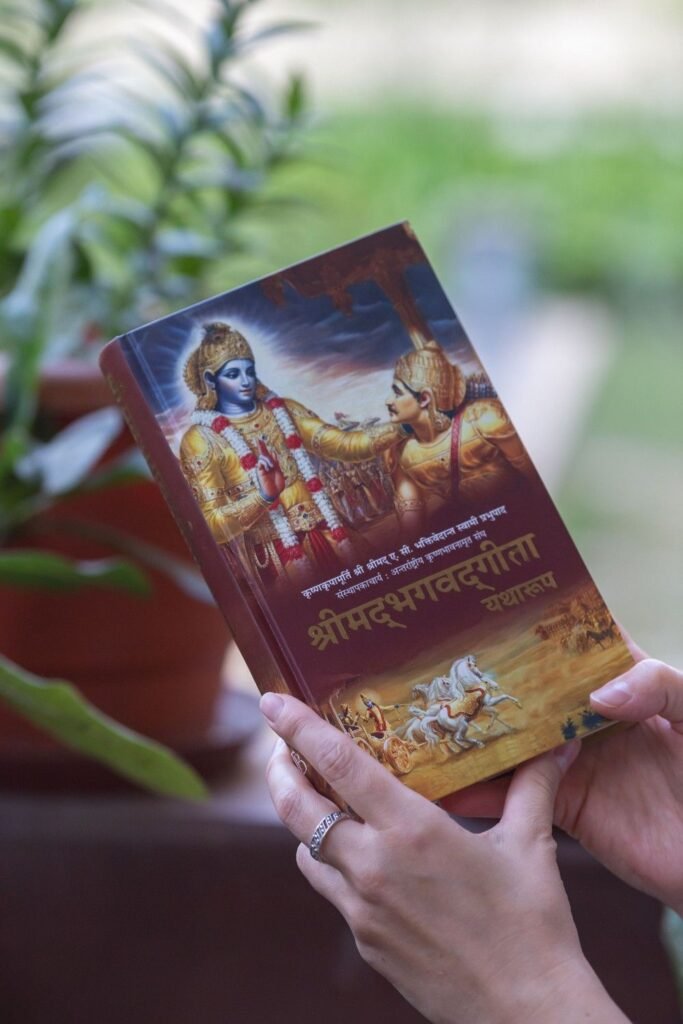
BG 5.21
बाह्यस्पर्शेष्वसक्तात्मा विन्दत्यात्मनि यत्सुखम्। स ब्रह्मयोगयुक्तात्मा सुखमक्षयमश्नुते।।5.21।।
bāhya-sparśheṣhvasaktātmā vindatyātmani yat sukham sa brahma-yoga-yuktātmā sukham akṣhayam aśhnute
bāhya-sparśheṣhu—external sense pleasure; asakta-ātmā—those who are unattached; vindati—find; ātmani—in the self; yat—which; sukham—bliss; saḥ—that person; brahma-yoga yukta-ātmā—those who are united with God through yog; sukham—happiness; akṣhayam—unlimited; aśhnute—experiences
Translation
With the self unattached to external contacts, he finds happiness in the Self; with the self engaged in the meditation of Brahman, he attains endless happiness.
Commentary
5.21 बाह्यस्पर्शेषु in external contacts? असक्तात्मा one whose mind is unattached? विन्दति finds? आत्मनि in,the Self? यत् (that) which? सुखम् happiness? सः he? ब्रह्मयोगयुक्तात्मा with the self engaged in the meditation of Brahman? सुखम् happiness? अक्षयम् endless? अश्नुते enjoys.Commentary When the mind is not attached to external objects of the senses? when one is deeply engaged in the contemplation of Brahman? he finds undecaying bliss in the Self within. If you want to enjoy the imperishable happiness of the Self within? you will have to withdraw the senses from their respective objects and plunge yourself in deep meditation on the Self within. This is the gist of this verse.
BG 5.22
ये हि संस्पर्शजा भोगा दुःखयोनय एव ते। आद्यन्तवन्तः कौन्तेय न तेषु रमते बुधः।।5.22।।
ye hi sansparśha-jā bhogā duḥkha-yonaya eva te ādyantavantaḥ kaunteya na teṣhu ramate budhaḥ
ye—which; hi—verily; sansparśha-jāḥ—born of contact with the sense objects; bhogāḥ—pleasures; duḥkha—misery; yonayaḥ—source of; eva—verily; te—they are; ādya-antavantaḥ—having beginning and end; kaunteya—Arjun, the son of Kunti; na—never; teṣhu—in those; ramate—takes delight; budhaḥ—the wise
Translation
The enjoyments that arise from contact are only sources of pain, for they have a beginning and an end, O Arjuna; the wise do not rejoice in them.
Commentary
5.22 ये which? हि verily? संस्पर्शजाः contactborn? भोगाः enjoyments? दुःखयोनयः generators of pain? एव only? ते they? आद्यन्तवन्तः having beginning and end? कौन्तेय O Kaunteya? न not? तेषु in those? रमते rejoices? बुधः the wise.Commentary Man goes in est of joy and searches in the external perishable objects for his happiness. He fails to get it but instead he carries a load of sorrow on his head.You should withdraw the senses from the senseobjects as there is no trace of happiness in them and fix the min on the immortal? blissful Self within. The senseobjects have a beginning and an end. Separation from the senseobjects gives you a lot of pain. During the interval between the origin and the end you experience a hollow? momentary? illusory pleasure. This fleeting pleasure is due to Avidya or ignorance. Even in the other world you will have the same experience. He who is endowed with discrimination or the knowledge of the Self will never rejoice in these sensual objects. Only ignorant persons who are passionate will rejoice in the senseobjects. (Cf.II.14?XVIII.38)
BG 5.23
शक्नोतीहैव यः सोढुं प्राक्शरीरविमोक्षणात्। कामक्रोधोद्भवं वेगं स युक्तः स सुखी नरः।।5.23।।
śhaknotīhaiva yaḥ soḍhuṁ prāk śharīra-vimokṣhaṇāt kāma-krodhodbhavaṁ vegaṁ sa yuktaḥ sa sukhī naraḥ
śhaknoti—is able; iha eva—in the present body; yaḥ—who; soḍhum—to withstand; prāk—before; śharīra—the body; vimokṣhaṇāt—giving up; kāma—desire; krodha—anger; udbhavam—generated from; vegam—forces; saḥ—that person; yuktaḥ—yogi; saḥ—that person; sukhī—happy; naraḥ—person
Translation
He who is able, while still here in this world, to withstand the impulse born out of desire and anger before the liberation from the body, he is a Yogi, and he is a happy man.
Commentary
5.23 शक्नोति is able? इह here (in this world)? एव even? यः who? सोढुम् to withstand? प्राक् before? शरीरविमोक्षणात् liberation from the body? कामक्रोधोद्भवम् born out of desire and anger? वेगम् the impulse? सः he? युक्तः united? सः he? सुखी happy? नरः man.Commentary Yukta means harmonised or steadfast in Yoga or selfabiding.Desire and anger are powerful enemies of peace. It is very difficult to annihilate them. You will have to make very strong efforts to destroy these enemies.When the word Kama (desire) is used in a general sense it includes all sorts of desires. It means lust in a special sense.While still here means while yet living. The impulse of desire is the agitation of the mind which is indicated by hairs standing on end and cheerful face. The impulse of anger is agitation of the mind which is indicated by fiery eyes? perspiration? biting of the lips and trembling of the body. In this verse you will clearly understand that he who has controlled desire and anger is the most happy man in this world? nor he who has immense wealth? a beautiful wife and beautiful children. Therefore you must try your level best to eradicate desire and anger? the dreadful enemies of eternal bliss.Kama (desire) is longing for a pleasant and agreeable object which gives pleasure and which is seen? heard of? or remembered. Anger is aversion towards an unpleasant and disagreeable object which gives pain and which is seen? heard or? or remembered.A Yogi controls the impulse born of desire and anger? destroyes the currents of likes and dislikes,and attains to eanimity of the mind? by resting in the innermost Self? and so he is very happy.(Cf.VI.18)
BG 5.24
योऽन्तःसुखोऽन्तरारामस्तथान्तर्ज्योतिरेव यः। स योगी ब्रह्मनिर्वाणं ब्रह्मभूतोऽधिगच्छति।।5.24।।
yo ‘ntaḥ-sukho ‘ntar-ārāmas tathāntar-jyotir eva yaḥ sa yogī brahma-nirvāṇaṁ brahma-bhūto ‘dhigachchhati
yaḥ—who; antaḥ-sukhaḥ—happy within the self; antaḥ-ārāmaḥ—enjoying within the self; tathā; antaḥ-jyotiḥ—illumined by the inner light; eva—certainly; yaḥ—who; saḥ; yogī—yogi; brahma-nirvāṇam—liberation from material existence; brahmabhūtaḥ— united with the Lord; adhigachchhati—attains
Translation
He who is happy within, who rejoices within, and who is illuminated within, that Yogi attains absolute freedom, or Moksha, becoming Brahman himself.
Commentary
5.24 यः who? अन्तःसुखः one whose happiness is within? अन्तरारामः one who rejoices within? तथा also? अन्तर्ज्योतिः one who is illuminated within? एव even? यः who? सः that? योगी Yogi? ब्रह्मनिर्वाणम् absolute freedom or Moksha? ब्रह्मभूतः becoming Brahman? अधिगच्छति attains.Commentary Within meansin the Self. He attains Brahmanirvanam or liberation while living. He becomes a Jivanmukta.
BG 5.25
लभन्ते ब्रह्मनिर्वाणमृषयः क्षीणकल्मषाः। छिन्नद्वैधा यतात्मानः सर्वभूतहिते रताः।।5.25।।
labhante brahma-nirvāṇam ṛiṣhayaḥ kṣhīṇa-kalmaṣhāḥ chhinna-dvaidhā yatātmānaḥ sarva-bhūta-hite ratāḥ
labhante—achieve; brahma-nirvāṇam—liberation from material existence; ṛiṣhayaḥ—holy persons; kṣhīṇa-kalmaṣhāḥ—whose sins have been purged; chhinna—annihilated; dvaidhāḥ—doubts; yata-ātmānaḥ—whose minds are disciplined; sarva-bhūta—for all living entities; hite—in welfare work; ratāḥ—rejoice
Translation
The sages obtain absolute freedom or Moksha when their sins have been destroyed, their dualities have been torn asunder, they are self-controlled, and they are intent on the welfare of all beings.
Commentary
5.25 लभन्ते obtain? ब्रह्मनिर्वाणम् absolute freedom? ऋषयः the Rishis? क्षीणकल्मषाः those whose sins are destroyed? छिन्नद्वैधाः whose dualities are torn asunder? यतात्मानः those who are selfcontrolled? सर्वभूतहिते in the welfare of all beings? रताः rejoicing.Commentary Sins are destroyed by the performance of Agnihotra (a daily obligatoyr ritual) and other Yajnas (vide notes on verse III. 13) without expectation of their fruits and by other selfless services. The duties vanish by constant meditation on the nondual Brahman. He never hurts others in thought? word and deed? and he is devoted to the welfare of all beings as he feels that all beings are but his own Self. (Cf.XII.4)
BG 5.26
कामक्रोधवियुक्तानां यतीनां यतचेतसाम्। अभितो ब्रह्मनिर्वाणं वर्तते विदितात्मनाम्।।5.26।।
kāma-krodha-viyuktānāṁ yatīnāṁ yata-chetasām abhito brahma-nirvāṇaṁ vartate viditātmanām
kāma—desires; krodha—anger; vimuktānām—of those who are liberated; yatīnām—of the saintly persons; yata-chetasām—those self-realized persons who have subdued their mind; abhitaḥ—from every side; brahma—spiritual; nirvāṇam—liberation from material existence; vartate—exists; vidita-ātmanām—of those who are self-realized
Translation
Absolute freedom exists on all sides for those self-controlled ascetics who are free from desire and anger, who have controlled their thoughts, and who have realized the Self.
Commentary
5.26 कामक्रोधवियुक्तानाम् of those who are free from desire and anger? यतीनाम् of the selfcontrolled ascetics? यतचेतसाम् of those who have controlled their thoughts? अभितः on all sides? ब्रह्मनिर्वाणम् absolute freedom? वर्तते exists? विदितात्मनाम् of those who have realised the Self.Commentary Those who renounce all actions and practise Sravana (hearing of the scriptures)? Manana (reflection) and Nididhyasana (meditation)? who are established in Brahman or who are steadily devoted to the knowledge of the Self attain liberation or Moksha instantaneously (Kaivalya Moksha). Karma Yoga leads to Moksha step by step (Krama Mukti). First comes purification of the mind? then knowledge? then renunciation of all actions and eventually Moksha.
BG 5.27
स्पर्शान्कृत्वा बहिर्बाह्यांश्चक्षुश्चैवान्तरे भ्रुवोः। प्राणापानौ समौ कृत्वा नासाभ्यन्तरचारिणौ।।5.27।।
sparśhān kṛitvā bahir bāhyānśh chakṣhuśh chaivāntare bhruvoḥ prāṇāpānau samau kṛitvā nāsābhyantara-chāriṇau yatendriya-mano-buddhir munir mokṣha-parāyaṇaḥ vigatechchhā-bhaya-krodho yaḥ sadā mukta eva saḥ
sparśhān—contacts (through senses); kṛitvā—keeping; bahiḥ—outside; bāhyān—external; chakṣhuḥ—eyes; cha—and; eva—certainly; antare—between; bhruvoḥ—of the eyebrows; prāṇa-apānau—the outgoing and incoming breaths; samau—equal; kṛitvā—keeping; nāsa-abhyantara—within the nostrils; chāriṇau—moving; yata—controlled; indriya—senses; manaḥ—mind; buddhiḥ—intellect; muniḥ—the sage; mokṣha—liberation; parāyaṇaḥ—dedicated; vigata—free; ichchhā—desires; bhaya—fear; krodhaḥ—anger; yaḥ—who; sadā—always; muktaḥ—liberated; eva—certainly; saḥ—that person
Translation
Shutting out all external contacts and fixing the gaze between the eyebrows, realizing the outgoing and incoming breaths moving within the nostrils.
Commentary
5.27 स्पर्शान् contacts? कृत्वा बहिः shutting out? बाह्यान् external? चक्षुः eye (gaze)? च and? एव even? अन्तरे in the middle? भ्रुवोः of the (two) eyrows? प्राणापानौ the outgoing and incoming breaths? समौ eal? कृत्वा having made? नासाभ्यन्तरचारिणौ moving inside the nostrils.Commentary The verses 27 and 28 deal with the Yoga of meditation (Dhyana). External objects or contacts are the sound and the other senseobjects. If the mind does not think of the external objects they are shut out from the mind. The senses are the doors or avenues through which sound and the other senseobjects enter the mind.If you fix the gaze between the eyrows the eyalls remain fixed and steady. Rhythmical breathing is described here. You will have to make the breath rhythmical. The mind becomes steady when the breath becomes rhythmical. When the breath becomes rhythmical there is perfect harmony in the mind and the whole system. (Cf.VI.10?14VIII.10)
BG 5.28
यतेन्द्रियमनोबुद्धिर्मुनिर्मोक्षपरायणः। विगतेच्छाभयक्रोधो यः सदा मुक्त एव सः।।5.28।।
yatendriya-mano-buddhir munir mokṣa-parāyaṇaḥ vigatecchā-bhaya-krodho yaḥ sadā mukta eva saḥ
yata—controlled; indriya—senses; manaḥ—mind; buddhiḥ—intelligence; muniḥ—the transcendentalist; mokṣa—liberation; parāyaṇaḥ—being so destined; vigata—discarded; icchā—wishes; bhaya—fear; krodhaḥ—anger; yaḥ—one who; sadā—always; muktaḥ—liberated; eva—certainly; saḥ—he is
Translation
With the senses, mind, and intellect ever controlled, having liberation as their supreme goal, free from desire, fear, and anger, the sage is truly liberated forever.
Commentary
5.28 यतेन्द्रियमनोबुद्धिः with senses? mind and intellect (ever) controlled? मुनिः the sage? मोक्षपरायणः having liberation as his supreme goal? विगतेच्छाभयक्रोधः free from desire? fear and anger? यः who? सदा for ever? मुक्तः free? एव verily? सः he.Commentary If one is free from desire? fear and anger he enjoys perfect peace of mind. When the senses? the mind and the intellect are subjugated? the sage does constant contemplation and,attains for ever to the absolute freedom or Moksha.The mind becomes restless when the modifications of deisre? fear and anger arise in it. When one becomes desireless? the mind moves towards the Self spontaneously liberation or Moksha becomes his highest goal.Muni is one who does Manana or reflection and contemplation.
BG 5.29
भोक्तारं यज्ञतपसां सर्वलोकमहेश्वरम्। सुहृदं सर्वभूतानां ज्ञात्वा मां शान्तिमृच्छति।।5.29।।
bhoktāraṁ yajña-tapasāṁ sarva-loka-maheśhvaram suhṛidaṁ sarva-bhūtānāṁ jñātvā māṁ śhāntim ṛichchhati
bhoktāram—the enjoyer; yajña—sacrifices; tapasām—austerities; sarva-loka—of all worlds; mahā-īśhvaram—the Supreme Lord; su-hṛidam—the selfless Friend; sarva—of all; bhūtānām—the living beings; jñātvā—having realized; mām—me (Lord Krishna); śhāntim—peace; ṛichchhati—attains
Translation
He who knows Me as the enjoyer of sacrifices and austerities, the great Lord of all the worlds, and the friend of all beings, attains peace.
Commentary
5.29 भोक्तारम् the enjoyer? यज्ञतपसाम् of sacrifices and austerities? सर्वलोकमहेश्वरम् the great Lord of all worlds? सुहृदम् friend? सर्वभूतानाम् of all beings? ज्ञात्वा having known? माम् Me? शान्तिम् peace? ऋच्छति attains.Commentary I am the Lord of all sacrifices and austerities. I am their author? goal and their God. I am the friend of all beings? the doer of good to them without expecting any return for it. I am the dispenser of the fruits of all actions and the silent witness of their minds? thoughts and actions as I dwell in their hearts. On knowing Me? they attain peace and liberation or Moksha (deliverance from the round of birth and death and all worldly miseries and sorrows). (Cf.V.15IX.24)Thus in the Upanishads of the glorious Bhagavad Gita? the science of the Eternal? the scripture of Yoga? the dialogue between Sri Krishna and Arjuna? ends the fifth discourse entitled The Yoga of Renunciation of Action.
